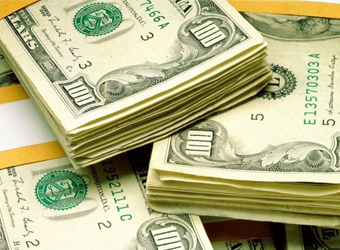Dollar slumped to seven-week lows on Thursday, pressured by investors’ concerns about protectionism after President Donald Trump gave the go-ahead to construction of Mexican border wall and prepared to impose some immigration curbs.
The dollar index, which tracks the greenback against a basket of major currencies, was last down 0.1 percent at 99.886. It dipped to 99.793 earlier in the day, its lowest level since Dec. 8.
The dollar was generally weaker despite a rally on Wall Street, where the Dow Jones Industrial Average closed atop the 20,000 mark for the first time.
Trump has made several business-friendly decisions since taking office on Friday, including signing executive orders to reduce regulatory burdens on domestic manufacturers and clearing the way for the construction of two oil pipelines.
However, the president’s broad but divisive plans to reshape U.S. immigration and national security policy rattled some investors, partly because the U.S. needs foreign capital to finance its large current account deficit.
Trump on Wednesday ordered construction of a U.S.-Mexican border wall and punishment for cities shielding illegal immigrants, and he also mulled restoring a CIA secret detention program.
“Amid concerns over Trump’s protectionism, the correlation between U.S. Treasury yields and the dollar has gotten weaker,” said Junya Tanase, chief currency strategist at JPMorgan Chase Bank.
The dollar last stood at 113.38 yen against the yen, nearly flat on the day and not far from a two-month low of 112.52 yen touched on Tuesday, even as U.S. Treasuries yields stayed near four-week highs.
The U.S. benchmark 10-year Treasury yield last stood at 2.523 percent, close to a 4-week high of 2.538 percent hit on Wednesday.
“It’s similar to the U.S.-Japan trade conflicts in 1990s. Back then, the dollar was weak despite the high U.S. interest rates. The dollar would remain weak if Trump pushes his protectionist rhetoric,” said JPMorgan Chase’s Tanase.
On immigration policy, Trump is expected to sign an executive order in the coming days to block the entry of refugees from war-torn Syria and suspend the entry of any immigrants from Muslim-majority Middle Eastern and African countries while permanent rules are studied.
However, some analysts are sceptical as to what extent Trump would back up his protectionist remarks with action.
“It is highly doubtful whether Trump would go ahead with a large-scale immigration ban to an extent that would affect the markets in a long term,” said Masashi Murata, senior currency strategist at Brown Brothers Harriman.
“Trump would keep his strong rhetoric from his candidate days to assure his followers, but he has not detailed the actual action plans. His policy won’t be a straight-forward protectionism, considering his positive comments on the strong Mexican economy,” added Murata.
Mexico’s peso strengthened to a three-week high of 20.9300 peso on Wednesday as Trump said the country’s economic future was important to the United States. The currency last stood at 21.0835 pesos per dollar.
Sterling was last up 0.1 percent at $1.2648, its highest peak in six weeks. The pound was helped by expectations for a rapid trade deal between Britain and the United States, which Prime Minister Theresa May said on Wednesday would “put UK interests and UK values first.”
May will be the first foreign leader to meet the new U.S. president, and trade is expected to dominate their first talks on Friday.
Hopes for a clarity over the Brexit plan also pushed the pound. Britain said it would publish draft legislation on Thursday seeking parliament’s approval to begin formal divorce talks with the European Union as May agreed to lawmakers’ demands to publish her Brexit plan.
The euro was last up 0.1 percent at $1.0762 against the dollar, slightly below Tuesday’s seven-week high of $1.0775.
Source: Reuters


